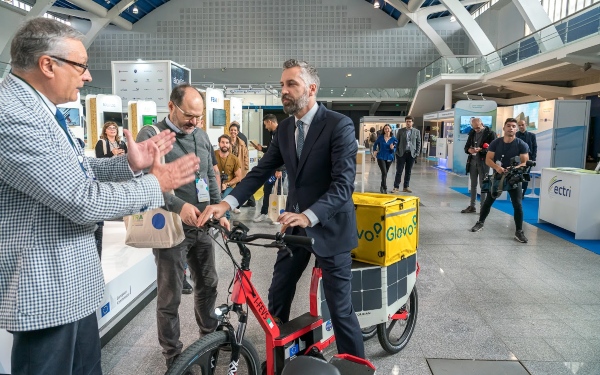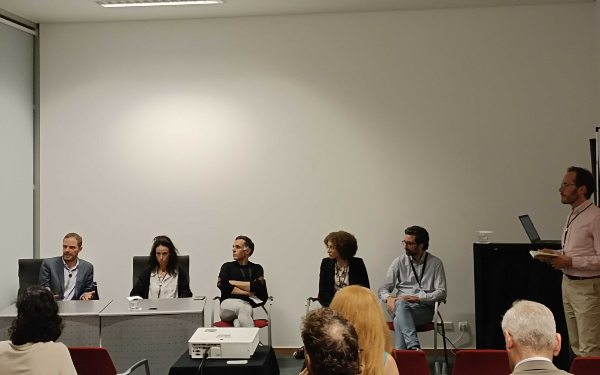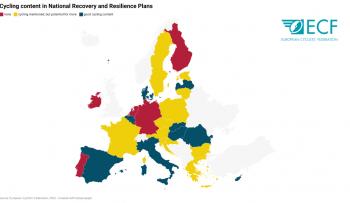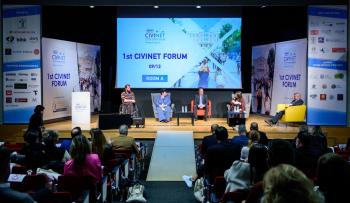
Getting cycling noticed as a full mode of transport at the Transport Research Arena
Philip Amaral, ECF Director of Policy and Development, attends the Transport Research Arena in Lisbon from 14-17 November.
Billed as Europe’s largest research and technology conference on transport and mobility, this year’s Transport Research Arena (TRA) was held under the theme of “moving together – reimagining mobility worldwide”, and attracted over two thousand people, including senior officials from the European Commission and national governments, as well as researchers and academics, businesses and civil society organisations.
As expected, TRA’s main themes and sessions had a heavy focus on innovation and technology, with a near-total focus on passenger automobiles and how they can be made to improve people’s safety and contribute to the decarbonisation of road transport through electrification. Other modes frequently discussed were aviation and rail, and to some extent, public transport systems.
Active mobility, walking and cycling, was a marginal conference theme. However, cycling did receive a prominent mention on the main floor of the TRA’s first plenary session when Portugal’s Infrastructure Minister, Pedro Nuno Santos, asserted that shifting people to active modes of transport, along with public transport “is the most effective instrument for the decarbonisation of transport.” This statement came after he argued that a rapid uptake of electric cars will not solve their fundamental problem, which is the congestion they produce, the time lost in traffic and the unsustainable levels of road accidents they cause.

Minister Pedro Nuno Santos tests out a cargo bike (Source: traconference.eu)
Many of the TRA attendees were eager to discuss ways to make walking and cycling more frequently chosen option by Europeans and how governments could support that. A number of smaller “invited” sessions and scientific paper sessions discussed cycling, from how to measure cycling’s modal share at the national level to how to integrate cycling with public transport.
ECF participated in two of these sessions. The first was one hosted by Tunnel Euralpin Lyon Turin (TELT), a company presently constructing a cross-border section of the new Lyon-Turin freight and passenger railway, much of which will be a tunnel. Here I presented to a small audience how railway operators can successfully integrate cycling infrastructure into rail infrastructure projects, ensuring that both modes complement each other and enable more people to take CO2 emissions-free travel.

ECF Director of Policy and Development Philip Amaral moderates a panel presentation hosted by PinBike (Source: ECF)
The second session was a panel presentation hosted by PinBike, an Italian-based company that enables cities to provide citizens who cycle with direct financial incentives as a way to positively reinforce cycling behaviours. Moderating the panel, I facilitated a discussion with representatives from the Portuguese city of Braga, EIT Urban Mobility and other research institutes about how behaviour change methods and tools can be used to get more people cycling. For example, in an EU-funded project called Bicification, registered users received monetary awards from the local authorities for their cycle trips. This led to more people cycling in cities like Braga, but also local authorities having access to reliable data about people’s cycling trajectories, helping them map where people cycle and using that as a basis to make decisions on cycling infrastructure.
In conclusion, the TRA in Lisbon was a useful occasion for ECF to meet with friends and forge new relationships, and to continue putting cycling front and centre among other modes of transport. Though it is clear that, while other technologies such as electric vehicles have yet to be scaled up to meet the demands of the climate crisis, cycling is ready and able to meet this challenge right now as a mode of transport that is already accessible to many millions of Europeans and is a proven machine that can fight climate change.
Cover photo source: traconference.eu
Regions:
Contact the author
Recent news!
Upcoming events
Contact Us
Avenue des Arts, 7-8
Postal address: Rue de la Charité, 22
1210 Brussels, Belgium









